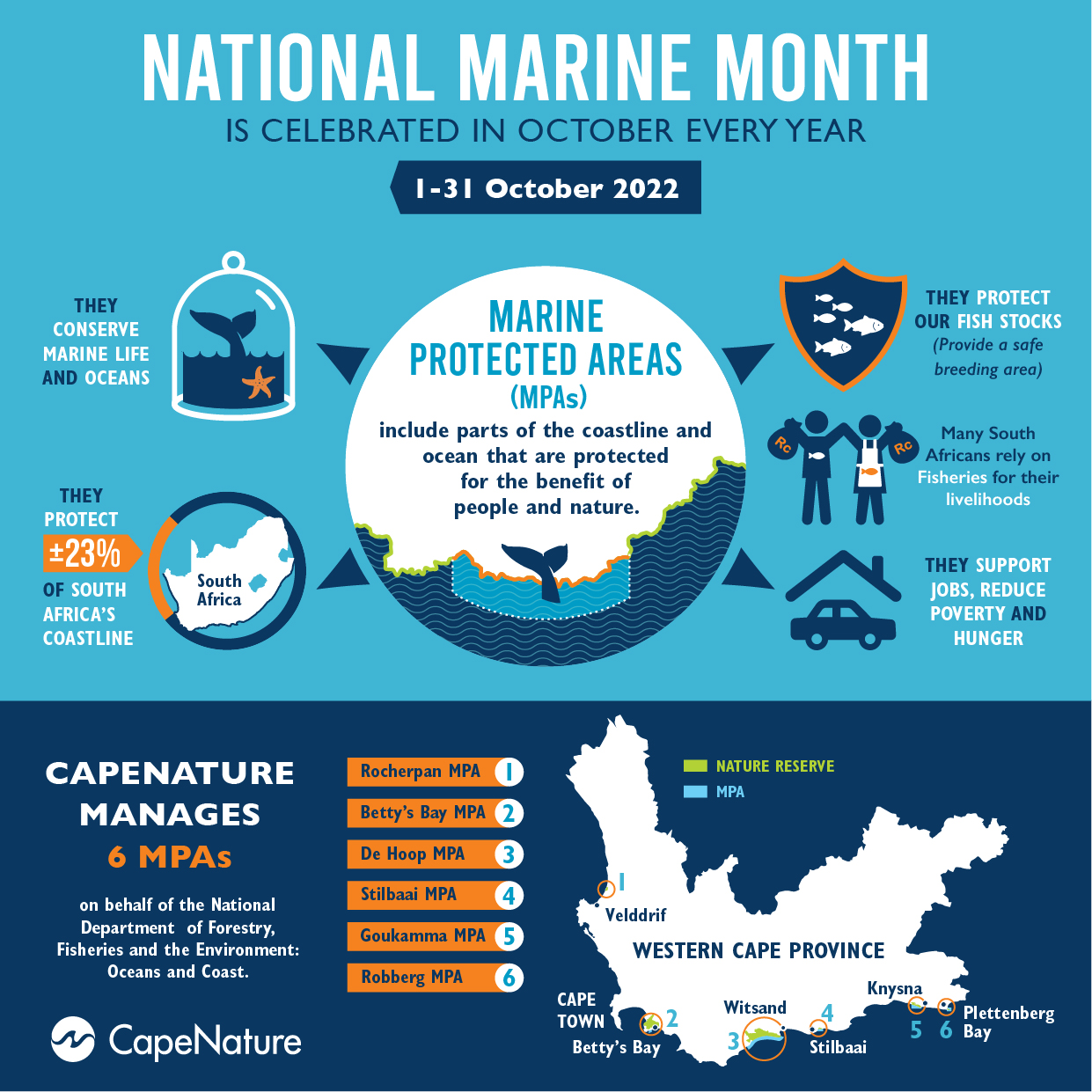GARDEN ROUTE | KAROO NEWS - Marine Month is celebrated annually during the month of October. The aim of this month is to create awareness about the marine and coastal environment as well as the promotion of sustainable use and conservation of our marine resources.
Our marine resources are often exposed to exploitation and illegal activities. Within the Western Cape, the biggest threat to our marine resources is the prevalence of poaching.
According to Pierre De Villiers, Senior Manager for CapeNature, “There has been a rapid increase in the number of poacher's vessels catching West Coast rock lobster in Marine Protected Areas (MPAs) and divers removing abalone in recent years. These resources can fetch up to R2 000 a kilogram on the international market. We need to turn the culture around so that people start really valuing Marine Protected Areas. They don’t only provide extractive, but many non-extractive resources and benefits to people”.
Overfishing also poses a threat to our marine resources. According to the South African Sustainable Seafood Initiative (SASSI), there has been a dramatic increase in the number of fish and other marine creatures extracted from the seas in recent decades.
Many line-fish species, the most accessible of our inshore fish stocks, are overexploited or have collapsed because of illegal fishing methods and overfishing.
This illegal activity also has an adverse impact on other marine species that rely on fish as their food sources such as seabirds and other marine animals. Other illegal activities include fishing without a license, fishing in protected areas, and using banned fishing gear that is destructive such as illegal fishing nets, catching beyond limits, or catching protected species. Ultimately, illegal activities result in the decline of our precious marine resources and adversely affect our coastal communities who depend on these resources as their livelihoods.
Benefits derived from marine resources include the fishing industry which is of great socio-economic importance in the Western Cape. It creates income for small-scale fishermen and provides food and income for subsistence fishing communities.
Larger fishing companies fish in the surrounding waters of the Western Cape, which contributes to the local economy.
The Western Cape also relies on the state of its pristine beaches and coastline to encourage and sustain our flourishing tourism industry.
The biodiversity economy plays a major role in creating much-needed jobs. One special job creation project is the Marine and Coastal Community Monitors, a WWF project in partnership with CapeNature and the Overstrand Municipality.
This project started in 2019 and employs mostly young people from the Kogelberg fishing communities which include Kleinmond, Betty’s Bay and Pringle Bay. Their role includes monitoring and capturing data on coasts, reporting on stranding networks, mortalities such as birds, seals, dassies, human activities, estuary pollution, and cleaning up pollution.
 Marine Month infographic
Marine Month infographic
In combatting illegal activities along our coastline, an integrated approach is followed which involves various stakeholders such as the Department of Environment, Forestry and Fisheries (DFFE), Municipal law enforcement and the South African Police Service (SAPS), in collaboration with CapeNature.
This integrated approach known as Operation Phakisa, an initiative of DFFE, highlights the government’s commitment to enhancing the blue ocean economy, enforcing maritime and marine legislation and combatting the pillaging of marine resources by poachers and illegal foreign fishing vessels. This multi-stakeholder collaboration has resulted in ensuring maritime laws and regulations are effectively implemented along the South African coast.
Currently, CapeNature manages six MPAs on behalf of the Department of Forestry, Fisheries and the Environment: Oceans and Coast. The MPAs are Robberg, Goukamma, Stillbaai, De Hoop, Betty’s Bay and Rocherpan. CapeNature is also involved in the monitoring and management of Marine Protected Area buffer areas or zones of influence. The marine environment forms a continuum and does not allow for “boundary fences”.
“Protecting and conserving our marine resources is an ongoing process and the responsibility remains with each citizen”, says Dr Razeena Omar, CEO: CapeNature.
“The public can also do their part in protecting and conserving our marine resources by making sure their fishing permits are legal, they adhere to catch sizes, joining various beach clean-ups, reporting any illegal activity and ensuring that their beach visits are always clean”.
The public can report poaching and illegal activities to their local SAPS office, or the nearest CapeNature office or report a crime anonymously to SAPS via CRIME STOP TIP-OFF-LINE on 086 00 10111.
For more information on any events or to get involved, you can visit our website at www.capenature.co.za or email learning@capenature.co.za.
'We bring you the latest Garden Route, Hessequa, Karoo news'
















